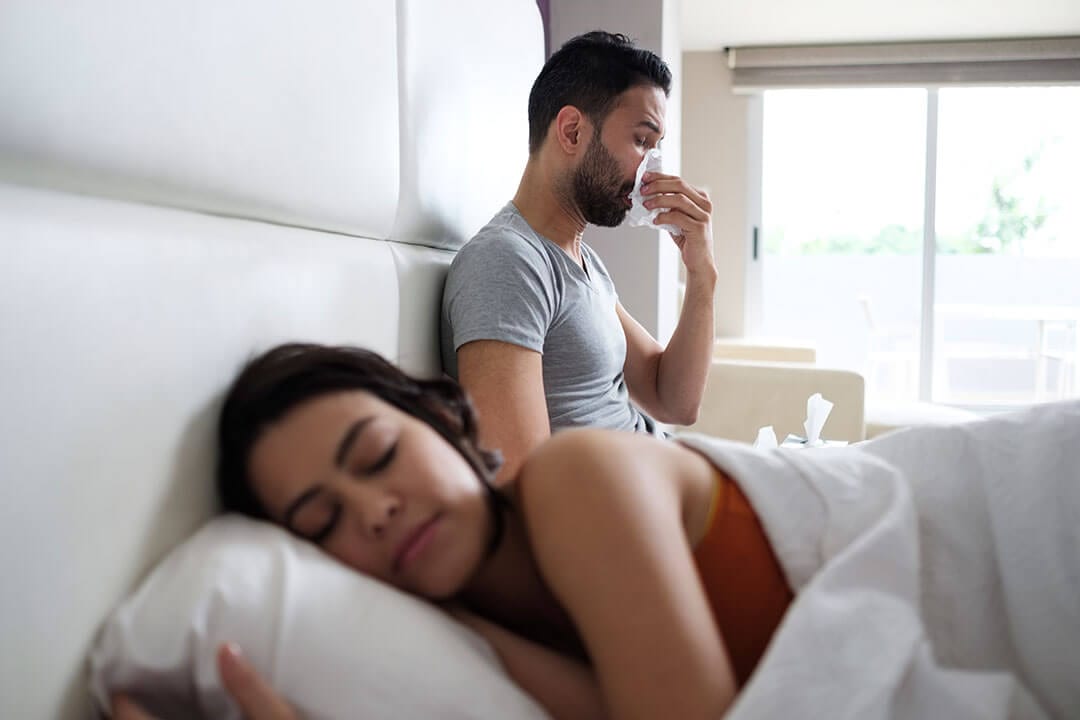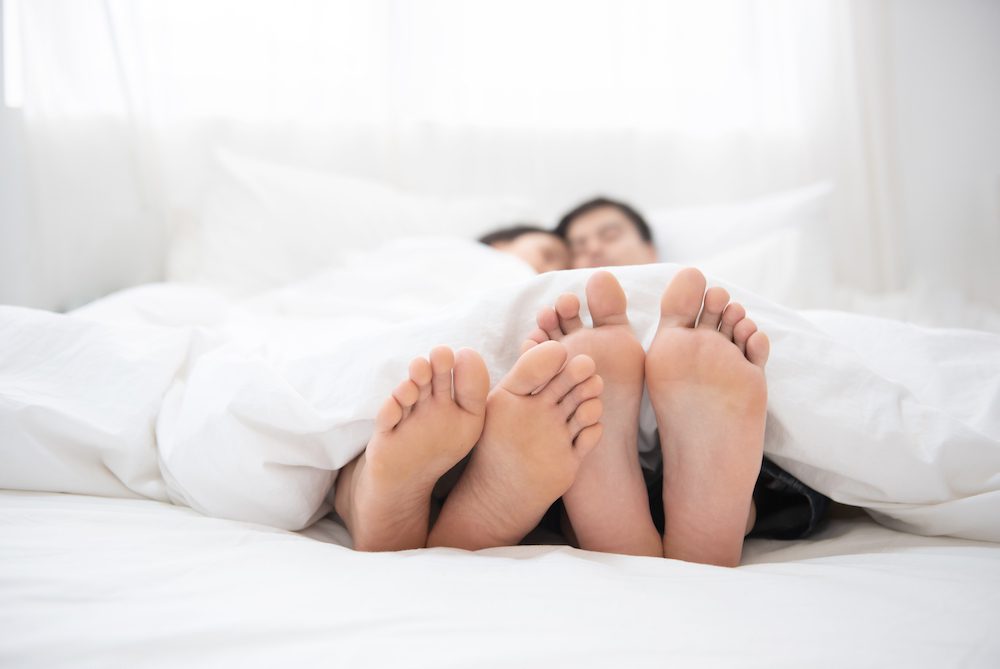Testosterone is a hormone produced in all people that has a wide range of effects in the body, influencing the growth of muscles, sex drive, bone health, and the production of red blood cells. Doctors may also prescribe testosterone as a treatment for low testosterone and as a part of gender-affirming care for transgender men.
Most testosterone in the body is produced during sleep, and having low levels of testosterone is linked to sleep problems. Additionally, getting too little sleep or having a sleep disorder can also reduce testosterone levels.
Learn more about how sleep impacts testosterone levels, how testosterone affects sleep, and what you can do to sleep better and boost your testosterone levels.
Key Takeaways
- Sleep is vital for regulating testosterone, a hormone crucial for muscle mass, bone health, and mood.
- Testosterone is primarily produced during the deep sleep stages.
- The relationship between sleep and testosterone is bidirectional, impacting each other’s levels.
- Aging and sleep disturbances can affect testosterone production, emphasizing the importance of healthy sleep habits.
Does Lack of Sleep Affect Testosterone?
Sleep problems can cause fluctuations in the level of testosterone in the body, and some research has shown that the adverse effects of certain sleep conditions like obstructive sleep apnea may contribute to lowered testosterone levels.
Blood levels of testosterone naturally change during the day. Testosterone levels are highest during sleep, and sleep problems can interfere with this nightly rise in testosterone. Problems with sleep quality, sleep loss, and breathing disorders such as sleep apnea are all linked to lower nighttime testosterone production in men and people assigned male at birth.
The Impact of Low Testosterone on Sleep
Low testosterone is linked to a number of negative impacts on sleep in men and people assigned male at birth, including more time spent awake after going to bed, more nighttime awakenings, lower oxygen levels during sleep, and less time spent in deep sleep.
The link between low testosterone and sleep problems in men is complex. One likely complicating factor is excess body fat. Having too much body fat can lower testosterone levels in people assigned male at birth, because fat, especially belly fat, produces a number of hormone changes.
It remains uncertain whether the testosterone itself causes sleep problems or if the true cause of sleep issues in people with low testosterone is excess body fat. Some research shows that most sleep issues associated with low testosterone disappear when excess weight is taken into account.
Less research exists on possible links between sleep problems and low testosterone in women and people assigned female at birth. However, some evidence suggests that low testosterone levels in women are linked to lower sleep efficiency, meaning more time spent awake in bed, rather than sleeping.
Does High Testosterone Affect Sleep?
High levels of testosterone can also affect sleep. For example, high testosterone due to the misuse of steroids has been linked to reduced sleep time, insomnia, and waking up more often during the night.
High levels of testosterone may be caused by conditions such as:
- Resistance to male sex hormones
- Tumors affecting the ovaries or testicles
- Genetic conditions
- Medicines or drugs that increase testosterone
Low vs. Normal Testosterone
Research has shown that testosterone levels start to decline naturally in men and people assigned male at birth around the age of 35. Men of any age may also experience hypogonadism, a condition in which testosterone levels, sperm counts, or both are lower than normal.
Causes of low testosterone in men and people assigned male at birth include:
- Age
- Problems with glands that produce hormones
- Issues in the part of the brain that regulates hormones
- A disease or injury affecting the testicles
- Excess body fat
- Obstructive sleep apnea
- Excessive exercise
- Side effects from medication, such as chemotherapy, steroids, and opioids
- Anorexia nervosa
In women and people assigned female at birth, testosterone production declines during the reproductive years. However, the ovaries continue to make testosterone after menopause, when estrogen production in the ovaries stops. When the body doesn’t produce enough testosterone or other male sex hormones, the condition is called androgen deficiency.
Causes of androgen deficiency in women and people assigned female at birth include:
- Age
- Removal of the ovaries
- Problems with other glands that produce hormones
- Anorexia nervosa
- Medications, such as steroids, birth control pills, or hormonal replacement therapy
- Infection with HIV
Symptoms of Low Testosterone
Although lower-than-normal testosterone does not always produce noticeable effects, it can cause a range of symptoms in people of any sex. Symptoms of low testosterone may include:
- Loss of sex drive
- Bone loss
- Loss of muscle and strength
- Mood disturbances like depression
- Difficulty concentrating
Additional symptoms of low testosterone in men and people assigned male at birth include:
- Difficulty getting an erection
- Lowered sperm count
- Increased body fat
How Are Low Testosterone and Sleep Apnea Linked?
Although obstructive sleep apnea in men and people assigned male at birth is often linked with low testosterone, the relationship between these conditions is not simple. In fact, it can be difficult to determine whether sleep apnea itself causes low testosterone, or whether factors like age and obesity are more responsible.
Some experts believe that obstructive sleep apnea itself has no effect on testosterone. Other experts believe that the sleep fragmentation and low oxygen levels associated with obstructive sleep apnea can cause low testosterone, independent of factors like age and obesity.
Research suggests that testosterone itself may inhibit breathing, which could potentially contribute to the higher prevalence of obstructive sleep apnea in men and people assigned male at birth. Transgender men taking gender-affirming hormone therapy and women with high levels of androgens are also more likely to experience obstructive sleep apnea.
It’s not yet clear whether treatment for obstructive sleep apnea improves testosterone levels. However, sleep apnea treatment does offer many other health benefits, including improved sleep, clearer thinking, better mood, and lower blood pressure.
How to Improve Sleep and Increase Testosterone
A good night’s sleep benefits the body in many ways. Among them, getting enough sleep, especially REM sleep, is important to the body’s production of testosterone. There are several measures you can take to improve both your testosterone levels and your sleep quality.
How to Increase Testosterone
If you are concerned about your testosterone levels, the first step is to talk to your doctor. Your doctor can measure your hormone levels and investigate any underlying health conditions that could cause low testosterone. If they find you have a testosterone deficiency, your doctor can prescribe appropriate treatment.
Testosterone therapy is a treatment option for men and people assigned male at birth who have certain medical conditions that cause consistently low levels of testosterone. However, the Food and Drug Administration (FDA) warns against the use of testosterone to treat low testosterone levels due to aging, since it has not been proven to be beneficial and safe.
Many steps you can take to promote good health may also support your body’s production of testosterone.
- Maintain a healthy weight: Having too much body fat can affect the balance of hormones in your body. Fat in your midsection produces chemicals that change testosterone to estrogen, leading to reduced testosterone overall.
- Exercise: Exercise can also increase testosterone. Engage in aerobic exercise that gets your blood pumping fast, as well as exercise that builds muscle.
- Get enough sleep: Most of the body’s testosterone is made during REM sleep. Interrupted sleep or early awakening can rob your body of the time it needs to make adequate amounts of testosterone.
- Limit alcohol: Don’t go overboard with alcohol. Research suggests that alcohol consumption may lead to lower levels of testosterone. More than two drinks a day may promote the conversion of testosterone to estrogen in the body.
- Be careful with opioids: Sometimes it’s necessary to use strong painkillers. But be aware that the use of opioid medications and illegal opioids can lead to lower blood levels of testosterone.
How to Get Better Sleep
Getting quality sleep is important for many aspects of good health, including optimal hormone production. Practicing good sleep habits can pay off in improved sleep and better health.
- Ensure good sleep hygiene: Having good sleep habits is often called sleep hygiene. Good sleep hygiene includes going to bed and waking on a regular schedule, keeping your bedroom dark, quiet, and comfortable, turning off your phone at bedtime, and avoiding caffeine and alcohol late in the day.
- Incorporate relaxation practices: Managing stress with relaxation techniques can help you cope with stress and wind down before falling asleep. Using relaxation exercises has been linked to improved sleep quality.
- Talk to your doctor about sleep disorders: Many people have sleep disorders that cause them to get less sleep than they need. If you have symptoms of a sleep disorder like trouble falling asleep, snoring or gasping during sleep, irresistible urges to move your legs at night, or trouble staying asleep, seek a medical evaluation.
References
Get Your Sleep Questions Answered Live on 4/30
Have questions about sleep? Get all your sleep-related questions answered in a Live Q&A on YouTube with renowned sleep expert Dr. Michael Breus at 5 p.m. PST/8 p.m. EST.









